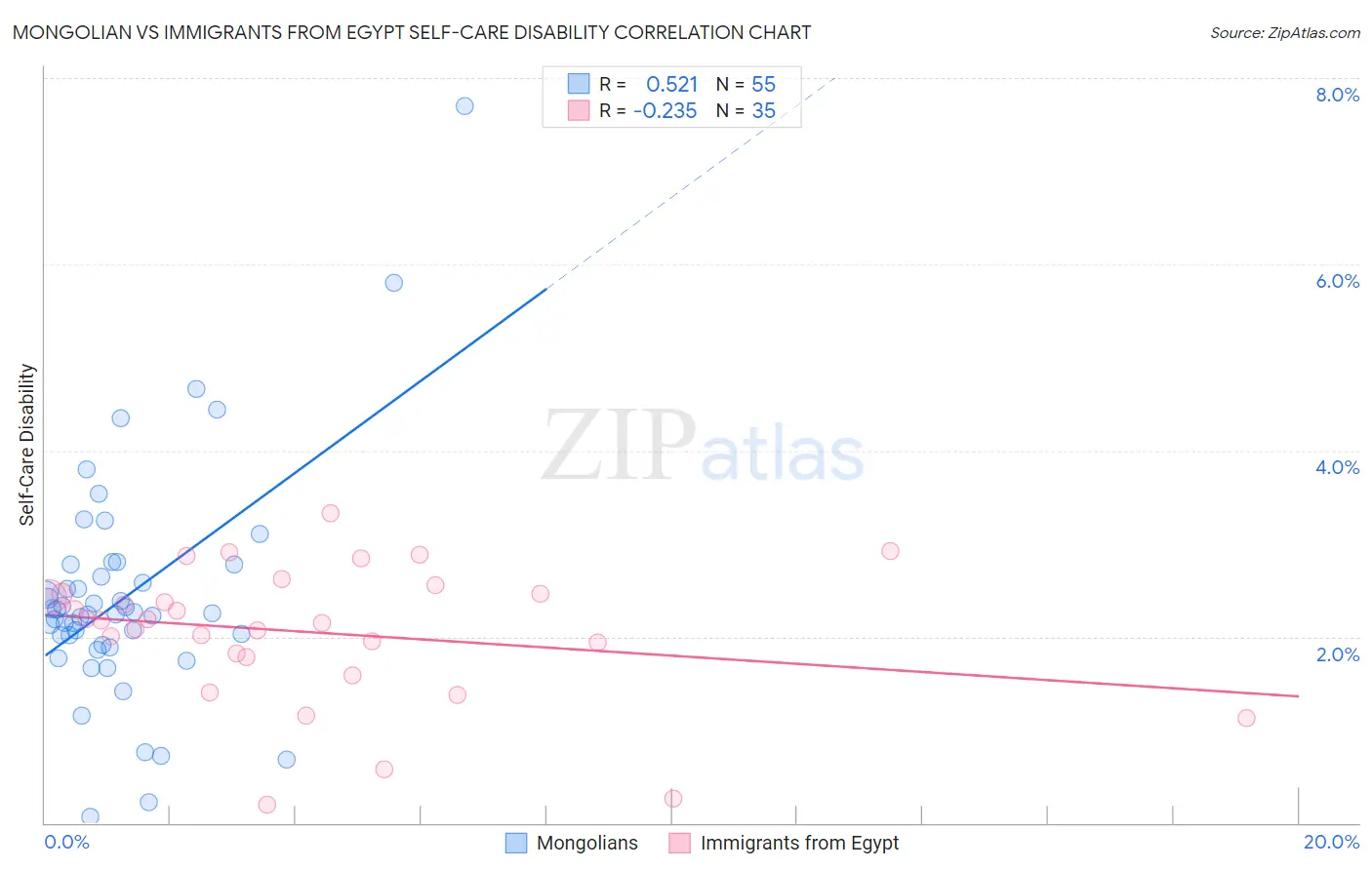Mongolian vs Immigrants from Egypt Self-Care Disability
COMPARE
Mongolian
Immigrants from Egypt
Self-Care Disability
Self-Care Disability Comparison
Mongolians
Immigrants from Egypt
2.3%
SELF-CARE DISABILITY
99.3/ 100
METRIC RATING
63rd/ 347
METRIC RANK
2.3%
SELF-CARE DISABILITY
99.1/ 100
METRIC RATING
73rd/ 347
METRIC RANK
Mongolian vs Immigrants from Egypt Self-Care Disability Correlation Chart
The statistical analysis conducted on geographies consisting of 140,258,079 people shows a substantial positive correlation between the proportion of Mongolians and percentage of population with self-care disability in the United States with a correlation coefficient (R) of 0.521 and weighted average of 2.3%. Similarly, the statistical analysis conducted on geographies consisting of 245,382,985 people shows a weak negative correlation between the proportion of Immigrants from Egypt and percentage of population with self-care disability in the United States with a correlation coefficient (R) of -0.235 and weighted average of 2.3%, a difference of 0.35%.

Self-Care Disability Correlation Summary
| Measurement | Mongolian | Immigrants from Egypt |
| Minimum | 0.065% | 0.20% |
| Maximum | 7.7% | 3.3% |
| Range | 7.6% | 3.1% |
| Mean | 2.4% | 2.0% |
| Median | 2.2% | 2.2% |
| Interquartile 25% (IQ1) | 1.9% | 1.8% |
| Interquartile 75% (IQ3) | 2.8% | 2.5% |
| Interquartile Range (IQR) | 0.86% | 0.68% |
| Standard Deviation (Sample) | 1.2% | 0.73% |
| Standard Deviation (Population) | 1.2% | 0.72% |
Demographics Similar to Mongolians and Immigrants from Egypt by Self-Care Disability
In terms of self-care disability, the demographic groups most similar to Mongolians are Swedish (2.3%, a difference of 0.010%), Brazilian (2.3%, a difference of 0.070%), Egyptian (2.3%, a difference of 0.090%), Immigrants from Argentina (2.3%, a difference of 0.10%), and South African (2.3%, a difference of 0.13%). Similarly, the demographic groups most similar to Immigrants from Egypt are Eastern European (2.3%, a difference of 0.030%), Asian (2.3%, a difference of 0.060%), Immigrants from Switzerland (2.3%, a difference of 0.060%), Immigrants from Northern Europe (2.3%, a difference of 0.090%), and Immigrants from Netherlands (2.3%, a difference of 0.10%).
| Demographics | Rating | Rank | Self-Care Disability |
| Immigrants | Cameroon | 99.6 /100 | #58 | Exceptional 2.3% |
| New Zealanders | 99.5 /100 | #59 | Exceptional 2.3% |
| Immigrants | Japan | 99.5 /100 | #60 | Exceptional 2.3% |
| Palestinians | 99.4 /100 | #61 | Exceptional 2.3% |
| Egyptians | 99.4 /100 | #62 | Exceptional 2.3% |
| Mongolians | 99.3 /100 | #63 | Exceptional 2.3% |
| Swedes | 99.3 /100 | #64 | Exceptional 2.3% |
| Brazilians | 99.3 /100 | #65 | Exceptional 2.3% |
| Immigrants | Argentina | 99.3 /100 | #66 | Exceptional 2.3% |
| South Africans | 99.3 /100 | #67 | Exceptional 2.3% |
| Immigrants | Zaire | 99.2 /100 | #68 | Exceptional 2.3% |
| Immigrants | Norway | 99.2 /100 | #69 | Exceptional 2.3% |
| Immigrants | Northern Europe | 99.2 /100 | #70 | Exceptional 2.3% |
| Asians | 99.2 /100 | #71 | Exceptional 2.3% |
| Eastern Europeans | 99.2 /100 | #72 | Exceptional 2.3% |
| Immigrants | Egypt | 99.1 /100 | #73 | Exceptional 2.3% |
| Immigrants | Switzerland | 99.1 /100 | #74 | Exceptional 2.3% |
| Immigrants | Netherlands | 99.1 /100 | #75 | Exceptional 2.3% |
| Immigrants | China | 99.1 /100 | #76 | Exceptional 2.3% |
| Immigrants | Middle Africa | 99.0 /100 | #77 | Exceptional 2.3% |
| Immigrants | Ireland | 99.0 /100 | #78 | Exceptional 2.3% |